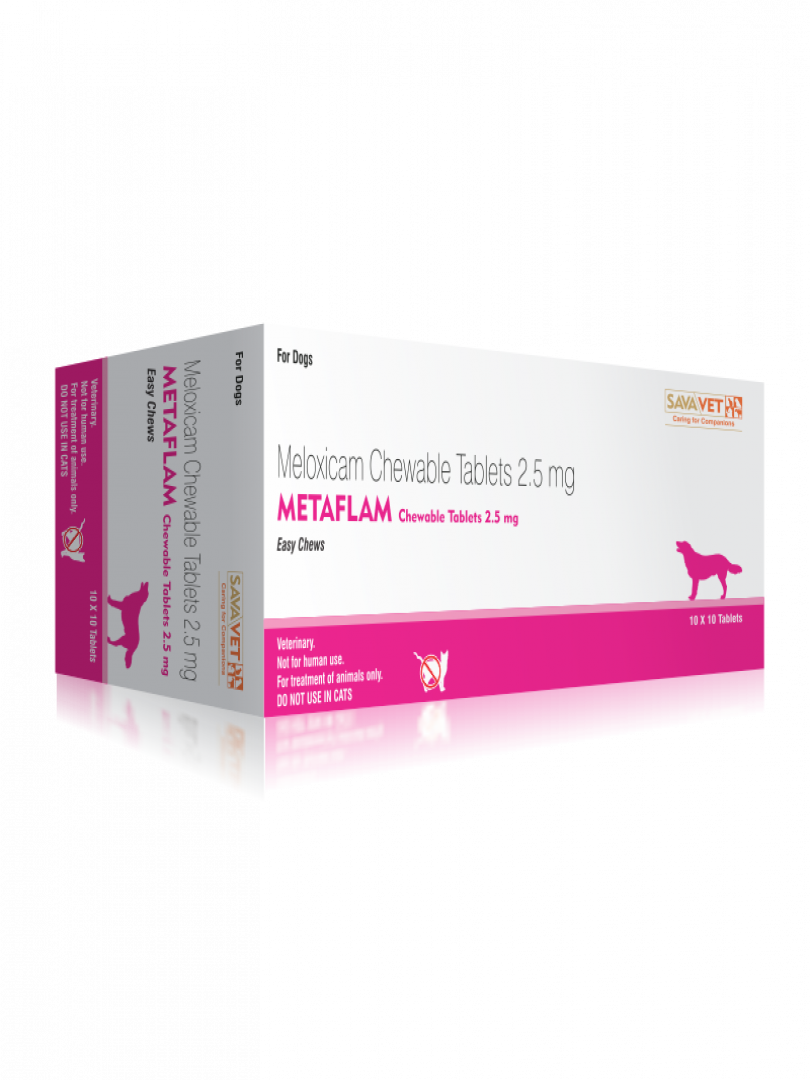COMPOSITION:
CATEGORY: Non-steroidal antiinflammatory drug
PHARMACOLOGY
Meloxicam is a non-steroidal antiinflammatory compound of the oxicam group which acts by inhibition of prostaglandin synthesis.
Meloxicam exerts anti-inflammatory, anti-exudative, analgesic and antipyretic effects. It inhibits leukocyte infiltration into the inflamed tissue and prevents bone and cartilage destruction. To a minor extent it also inhibits collagen-induced thrombocyte aggregation.
INDICATIONS:
Alleviation of inflammation and pain in both acute and chronic musculo-skeletal disorders in dogs.
DOSAGE AND ADMINISTRATION:
Initial treatment is a single dose of 0.2 mg meloxicam/kg body weight on the first day. Treatment is to be continued once daily by oral administration (at 24-hour intervals) at a maintenance dose of 0.1 mg meloxicam body weight. Each chewable contains 2.5 mg meloxicam, which corresponds to the daily maintenance dose for a 25 kg body weight dog respectively. Each chewable tablet can be halved for accurate dosing according to the individual body weight of the animal. Meloxicam chewable tablets can be administered with or without food.
CONTRAINDICATIONS, WARNINIGS ETC:
Do not use in pregnant or lactating animals.
Do not use in dogs suffering from gastrointestinal disorders such as irritation and haemorrhage, impaired hepatic, cardiac or renal function and haemorrhagic disorders.
Do not use in dogs less than 6 weeks of age or less than 4 kg body weight.
Do not use in cases of hypersensitivity to the active substance or to any of the excipients.
PRECAUTIONS
Meloxicam should not be administered concurrently with steroidal or other non-steroidal anti-inflammatory drugs, aminoglycoside antibiotics or anti-coagulant agents.
Pre-treatment with anti-inflammatory drugs may result in additional or increased adverse effects and accordingly a treatment free period with such drugs should be observed for at least 24 hours before commencement with meloxicam. The treatment free period, however, should take into account the pharmacokinetic properties of the drugs used previously.
Avoid use in dehydrated, hypovolaemic or hypotensive animals as there is potential risk of increased renal toxicity.
PREGNANCY AND LACTATION:
The safety of the veterinary medicinal product has not been established during pregnancy or lactation.
ADVERSE DRUG REACTIONS:
Typical adverse drug reactions of NSAIDs such as loss of appetite, vomiting, diarrhoea, faecal occult blood, letharthy and renal failure have occasionally been reported. In very rare cases haemorrhagic diarrhoea, haematemesis, gastrointestinal ulceration and elevated liver enzymes have been reported. These side effects occur generally within the first treatment week and are in most cases transient and disappear following termination of the treatment but in very rare cases may be serious or fatal.
If adverse reactions occur, treatment should be discontinued and the advice of a veterinarian should be sought.
OVERDOSAGE:
In case of overdose, symptomatic treatment should be initiated.

